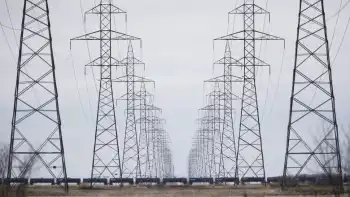Energy professionals: Another Dwight Duncan speech, but not much of a plan
TORONTO, ONTARIO - Ontario's Energy Minister Dwight Duncan has no plan for about 75 per cent of the province's electricity supply, says a group representing electricity professionals in Ontario.
"We're pleased that the Minister recognizes the importance of hydroelectric power," said Andrew Muller, president of the Society of Energy Professionals. "And we're very pleased that he has given Ontario Power Generation the primary role to pursue more of it."
Muller was commenting on a speech given recently by Energy Minister Dwight Duncan sponsored by the Canadian Club. In the speech, Minister Duncan announced that his government would ask OPG to "maximize hydroelectric development," especially in Northern Ontario.
"But hydroelectricity isn't enough," says Muller. "The government needs a plan for the rest of the industry, including nuclear power, fossil-fuel generation, and conservation." The Minister's announcements to date are lacking for the following reasons:
- The plan to close Ontario's coal-fired plants is unworkable;
- a political promise made to win an election that will run up against the realities of the electricity system;
- The plan to switch from coal to natural gas will be too expensive and risky, given the volatility of natural gas prices and the uncertainty of supply;
- The government's conservation plan consists only of punishingly high prices, smart meters, and unplugging "beer fridges".
The Society was particularly disappointed, says Muller, with the announcement that Minister Duncan would delay deciding OPG's role for its nuclear power plants by opening up a "debate" on nuclear power, to be overseen by the Ontario Power Authority.
"The Minister's ducking the issue," said Muller, president of the Society of Energy Professionals. "Given the place of nuclear power in Ontario, a commitment to renew our nuclear assets is inevitable, but it must be made before it's too late. Throwing the whole subject over to a 'debate' is a delay we just shouldn't allow. Ontarians need the fifty per cent of their electricity that the nuclear industry provides."
Here's what a plan for the industry would look like, says the Society:
- OPG should pursue all practical hydroelectric projects it has on its books;
- OPG should continue to refurbish with appropriate haste the rest of the Pickering A reactors, and the government should provide Bruce Power with the support necessary for the refurbishment of its own two "A" reactors; both companies should pursue new nuclear projects;
- Conservation programs should be embedded in the operations of the public utilities-generation, transmission, and distribution;
- Ontario should pursue all responsible methods of reducing emissions from its coal plants, and make public investments in new clean-coal technologies.
"Innovation and success in conservation will take public investment," says Muller. "There's no logical reason for keeping OPG out of wind-power and other renewables; in fact, wind-power and hydroelectric go together-each can back up the other. Pursuing the most promising emerging technologies for reducing coal emissions will take public investment. Finally, as the Minister acknowledged today, keeping our nuclear fleet up to speed will take public investment as well.
"There is no more time for delay," he said. "As the Minister said... we've had ten lost years in the electricity industry. We have to get moving now."
The Society of Energy Professionals represents more than 6,000 professional employees in the electricity industry in Ontario, including telecommunications and information technology professionals, engineers, scientists, middle managers, and others.
Related News

Cheaper electricity rate for customers on First Nations not allowed, Manitoba appeal court rules
WINNIPEG - Manitoba Hydro was wrongly forced to create a new rate class for electricity customers living on First Nations, the Manitoba Court of Appeal has ruled.
The court decided the Public Utilities Board "exceeded its jurisdiction" by mandating Indigenous customers on First Nations could have a different electricity rate from other Manitobans.
The board made the order in 2018, which exempted those customers from the general rate increase that year of 3.6 per cent.
"The directive constituted the creation and implementation of general social policy, an area outside of the PUB's jurisdiction and encroaching into areas that are better suited to the…




